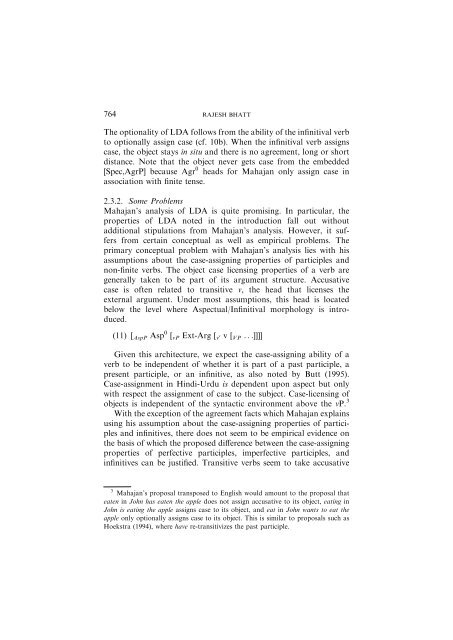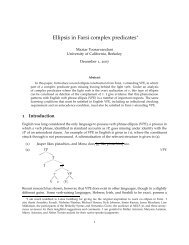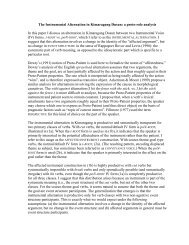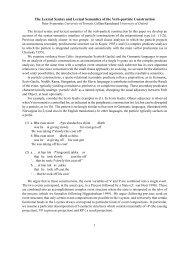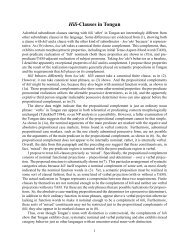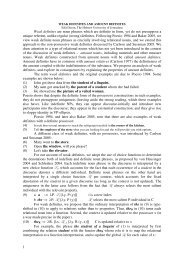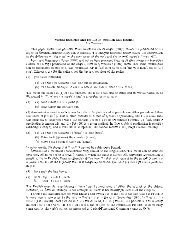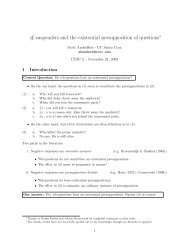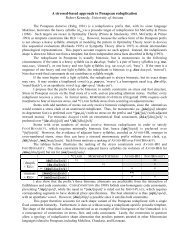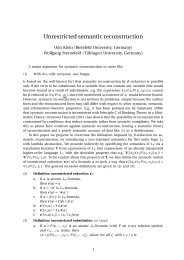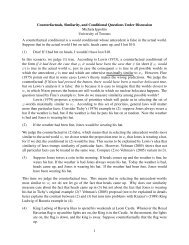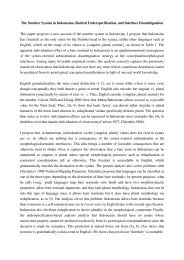LONG DISTANCE AGREEMENT IN HINDI-URDUw This paper ...
LONG DISTANCE AGREEMENT IN HINDI-URDUw This paper ...
LONG DISTANCE AGREEMENT IN HINDI-URDUw This paper ...
You also want an ePaper? Increase the reach of your titles
YUMPU automatically turns print PDFs into web optimized ePapers that Google loves.
764RAJESH BHATTThe optionality of LDA follows from the ability of the infinitival verbto optionally assign case (cf. 10b). When the infinitival verb assignscase, the object stays in situ and there is no agreement, long or shortdistance. Note that the object never gets case from the embedded[Spec,AgrP] because Agr 0 heads for Mahajan only assign case inassociation with finite tense.2.3.2. Some ProblemsMahajan’s analysis of LDA is quite promising. In particular, theproperties of LDA noted in the introduction fall out withoutadditional stipulations from Mahajan’s analysis. However, it suffersfrom certain conceptual as well as empirical problems. Theprimary conceptual problem with Mahajan’s analysis lies with hisassumptions about the case-assigning properties of participles andnon-finite verbs. The object case licensing properties of a verb aregenerally taken to be part of its argument structure. Accusativecase is often related to transitive v, the head that licenses theexternal argument. Under most assumptions, this head is locatedbelow the level where Aspectual/Infinitival morphology is introduced.(11) [ AspP Asp 0 [ vP Ext-Arg [ v¢ v[ VP ...]]]]Given this architecture, we expect the case-assigning ability of averb to be independent of whether it is part of a past participle, apresent participle, or an infinitive, as also noted by Butt (1995).Case-assignment in Hindi-Urdu is dependent upon aspect but onlywith respect the assignment of case to the subject. Case-licensing ofobjects is independent of the syntactic environment above the vP. 3With the exception of the agreement facts which Mahajan explainsusing his assumption about the case-assigning properties of participlesand infinitives, there does not seem to be empirical evidence onthe basis of which the proposed difference between the case-assigningproperties of perfective participles, imperfective participles, andinfinitives can be justified. Transitive verbs seem to take accusative3 Mahajan’s proposal transposed to English would amount to the proposal thateaten in John has eaten the apple does not assign accusative to its object, eating inJohn is eating the apple assigns case to its object, and eat in John wants to eat theapple only optionally assigns case to its object. <strong>This</strong> is similar to proposals such asHoekstra (1994), where have re-transitivizes the past participle.


